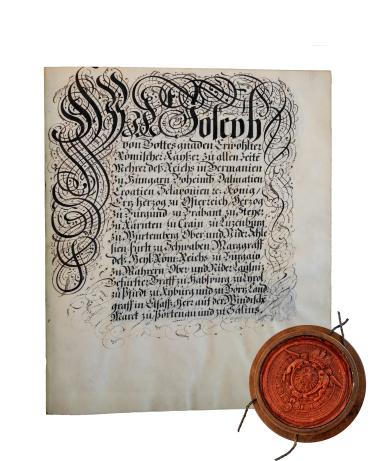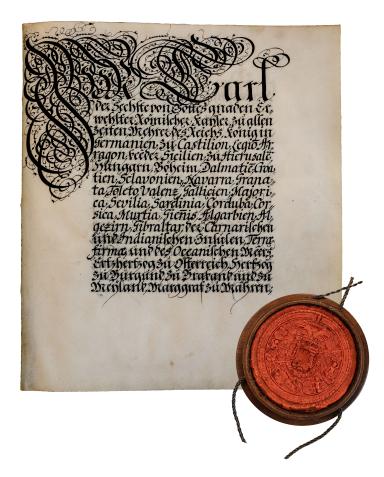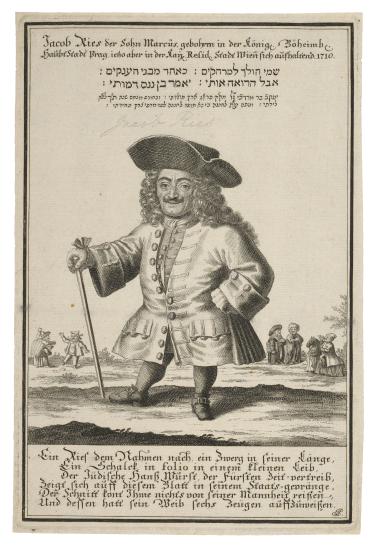Appointment of Samson Wertheimer as Imperial Court Factor in Vienna
Anonymous
1703
We, Leopold,1 elected Roman Emperor by the grace of God, in the name [of the House of Hapsburg], the name of our heirs and our descendants, with this letter proclaim publicly that we have graciously looked upon the industrious, indefatigable, efficacious, loyal and selfless services that have been rendered to the Holy Roman Empire and to our, the Imperial House of Austria [ . . . ] by the Court Factor [Ober Factor]2 Samson Wertheimer, chief rabbi of the Jews in our countries, throughout the last seventeen years. He has proven himself on various and important missions, here as well as in other places to which he was sent. [ . . . ] When heavy fighting broke out over the issue of the succession to the Spanish Crown, he came to the aid of the Roman Empire greatly expediting the military operations. [ . . . ] Further, in order to meet the innumerable and extraordinary expenses of the Imperial Court during the war, he not only spent in a wise and prudent manner the many millions provided him in cash by the War Treasury and the Court, but he also advanced [the Empire] several loans at [a low] interest. [ . . . ] To our great pleasure, he has managed to perform all these deeds by the allocation of subsidies, money, and work. Even today, he and his son are constantly busy serving us and the public; his only wish is the permission to continue his services. In the light of his well-known qualities, his high intelligence and his considerable skills this permission will gladly be granted. In grateful recognition of all this we have not only presented Samson Wertheimer and his son Wolff with our the Imperial chain of grace and our portrait. [ . . . ] Furthermore, we have decreed that Samson Wertheimer be designated as our Imperial Court Factor, in which title he shall hold before every man and authority our heirs and descendants included. But in order that our Court Factor Samson Wertheimer may enjoy our Imperial grace more fully, in order that he may accomplish his tasks with minimal hindrance and may peacefully travel, he and the members of his family, both in our Empire and in foreign lands, we have bestowed still another grace upon him: We have not only confirmed and ratified the protective privileges [ . . . ] but have extended their validity of another twenty years beyond the time specified therein. [ . . . ] We wish our Court Factor Samson Wertheimer to be successful in all further service which he will render us and the electors of the Empire. We are cognizant that his indefatigable services during the last seventeen years have diminished his bodily strength, and we therefore allow him to dwell in our Roman lands and the lands of our crown—together with his son, daughter-in-law, grandchildren and whoever may dwell with him presently, and also all members of his family of either sex, wherever they may be, grandchildren, servants and others included—for another twenty years, starting on May 18, 1715. During this time he will be exempt from all tithes and taxes. He will have to pay neither protection-money [Schutzgeld] nor tolerance-money [Toleranzgeld]. Nor will he have to pay any duties [ . . . ]. In all the above-mentioned places he will enjoy our Imperial and Royal protection, or the protection extended to him in our capacity as a territorial prince, and everywhere we will guarantee his personal security and the freedom of his movement [ . . . ] And wherever he may be, whether in the Empire or in our crown lands, whether with the members of his family or without them, their sojourn will be legal [ . . . ] All this they shall be able to do in peace and security, in freedom and without fear, and no further and special decree from our Court shall be necessary to confirm their rights. Furthermore, they shall not be disturbed in the observance of their religious rites and the Mosaic laws as they appertain to their daily life as well as in matters of death; this right is in accordance with the custom laid down in the constitution of the Empire where similar rights are granted to the Jewish communities which he, Wertheimer, serves as our privileged rabbi. These rights, however, do not affect any other Jews outside these communities. [ . . . ]
They shall also be entitled to possess, without any restriction, any Hebrew books which he, Wertheimer, needs for the performance of his rabbinical duties. . . . In case any member of the Wertheimer family [men of age] dies before this privilege and letter of grace expires, all clauses and articles contained therein will remain in force for the widow, children and servants until the specified date. It is understood that you, Wertheimer, will be personally responsible for the conduct of the members of your family and the integrity of their commercial transactions. We hereby order all authorities under our jurisdiction, ecclesiastical and secular, of both the higher and lower echelons, and especially the magistrate and the Lord Mayor of Vienna, the city of our Imperial residence, to protect our Court Factor and Court Jew Samson Wertheimer as well as his sons-in-law, grandchildren and anybody else who may happen to be in his company [ . . . ] until the date specified in this privilege, issued by our Imperial grace and within our capacity as a territorial prince: that they shall not be troubled, interfered with or harmed in any way, and that anybody who dares to do them any harm shall be punished by the withdrawal of our grace and a penal fine of thirty gold marks. We consider this to be a matter of great seriousness and put our Imperial seal to this document, issued in Vienna, our Imperial capital and city of residence, on August 29, 1703; the forty-sixth year of our Roman reign; the forty-ninth year of our Hungarian reign; the forty-seventh year of our Bohemian reign.
Notes
Words in brackets appear in the original translation.
[Leopold I of Hungary (1640–1705).—Ed.]
A great variety of titles were used to designate court Jews, e.g., Hofjude, Hoffactor, Hofprovedieteur, Hofagent, Kabinettfactor, and Kommerzienrat.
Credits
Published in: The Posen Library of Jewish Culture and Civilization, vol. 5.






